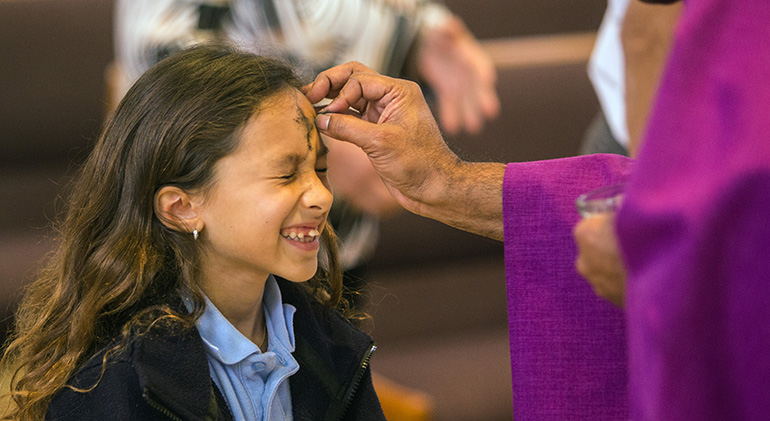By Communications Department - Archdiocese of Miami

Photographer: MARLENE QUARONI | FC
FILE PHOTO: Brianna Puglisi, 9, a second-grader at St. Rose of Lima School in Miami Shores, grimaces as St. Rose's pastor, Father George Packuvettithara, marks her forehead with ashes during Ash Wednesday Mass Feb. 14, 2018.
These are the 2020 Lenten and Triduum regulations issued by the Office of Worship of the Archdiocese of Miami.
Fast and abstinence
The holy season of Lent begins on Ash Wednesday, Feb. 26. Both Ash Wednesday and Good Friday, April 10, are days of abstinence from meat for all who are 14 years and older. They are also days of fast (one full meal and two small meals, with nothing eaten between the meals) for adults from 18 to 59 years of age. All Fridays of Lent are days of abstinence from meat for those 14 years and older.
Easter Vigil
Holy Saturday is celebrated April 11 this year. The entire Easter Vigil celebration is to begin after nightfall (8 p.m.) and end before the dawn of Easter Sunday. This rule is to be strictly observed in order to manifest the full meaning of the rites. The Easter Vigil is not to be celebrated at the time of the day that is customary to anticipated Sunday Masses.
Liturgical notes
Lent runs from Ash Wednesday until the Mass of the Lord’s Supper on Holy Thursday. The Easter Triduum is celebrated from Holy Thursday evening until evening prayer on Easter Sunday. Alleluia is not said or sung from the beginning of Lent until the Easter Vigil, nor is the “Te Deum” sung at or on Sundays of Lent.
During Lent, the altar should not be decorated with flowers, and musical instruments should be used to support the community singing while respecting the need for silence and reflection during other moments in the liturgy. On the fourth Sunday of Lent (“Laetare”) and on solemnities and feasts, musical instruments may be played and the altar decorated with flowers.
If marriages take place in Lent, couples are to be reminded that wedding plans should respect the special nature of this liturgical season in their simplicity.
It is recommended that during the Lenten season parishes should provide penitential celebrations that allow for the faithful to celebrate the mystery of forgiveness. These celebrations should take place before the Easter Triduum, and should not immediately precede the Evening Mass of the Lord’s Supper. Where there is genuine pastoral need, the sacrament of penance may be celebrated on Good Friday and Holy Saturday.

